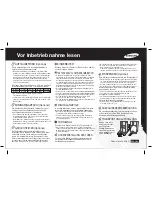
13
MARIN
EN 428001373037
Use and maintenance manual
7.
DISPOSAL OF WASTE MATERIAL
During normal operation, the appliance does not generate any environmental contamination. At the end of its life cycle, or if it is
necessary to proceed to permanent decommissioning, we recommend following the procedures below:
DISPOSAL
(USER)
The symbol, applied to either the product or its packaging, indicates that the product should not be considered as
normal domestic waste, but should be taken to a waste collection point for the recycling of electrical and electronic
appliances. The correct disposal of this product contributes to preventing potential negative consequences that might
derive from an inadequate disposal of the product. For detailed information about recycling this product, contact your
council, your local waste collection service or the store where you purchased the product.
PROCEDURE FOR DISPOSAL and RECYCLING AT THE END OF APPLIANCE LIFE CYCLE
(AUTHORISED
BODIES)
• Switch off the equipment and unplug the power supply cable.
• Remove the lamps (if installed). These should be disposed of separately.
• Remove the power supply units and the electronic cards. These must be disposed of separately.
• Disassemble all the independent parts (grids, casings, profiles, etc.) and separate them by homogeneous material characteristics,
in order to access the heat exchangers, pipes, cables, etc. being careful not to damage the refrigeration circuit.
• Remove all mobile parts (doors, sliding doors, glass parts, etc.) and group the various materials according to their similar
features.
• Check the type of refrigerant on the plate inside the counter; remove the refrigerant and dispose of it through the authorised
services.
• Disconnect the evaporator, condenser, compressor, pipes and fans; the tubes being made of copper, aluminium, steel and
plastic must be disposed of separately.
• After removing all the casings and the various components from the frame, separate the different types of material that
compose them (plastic, sheet metal, polyurethane, copper, etc.) and group by homogeneous characteristics.
All recyclable materials and waste must be treated and recycled in a professional manner and in accordance with
the directives of the country in question. The company assigned to recycling must be registered and certified as a
waste disposal service according to the specific directives of the country in question.
ATTENTION
Illegal disposal of the product by the owner will result in the application of administrative sanctions provided by the
laws in force. Disposal of the product should comply with current laws on the disposal of coolant liquids and mineral
oils.
IMPORTANT
If the crossed-out wheelie bin symbol is not attached to the device, it means that the manufacturer is not responsible
for disposal of the product; in this case, the current regulations on waste disposal always apply. Contact the competent
municipal office, the local waste disposal service or the shop where the product was purchased.
ADDITIONAL INFORMATION
Further information on how to dispose of coolant and oils and other substances can be found on the safety data sheet
of the substances themselves. To dispose of foamed assemblies, remember that the polyurethane foams used are
CFC-, HFC- and HCFC-free.














































